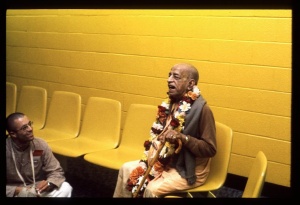SB 7.10.2

A.C. Bhaktivedanta Swami Prabhupada
TEXT 2
- śrī-prahrāda uvāca
- mā māṁ pralobhayotpattyā
- saktaṁkāmeṣu tair varaiḥ
- tat-saṅga-bhīto nirviṇṇo
- mumukṣus tvām upāśritaḥ
SYNONYMS
śrī-prahrādaḥ uvāca — Prahlāda Mahārāja said (to the Supreme Personality of Godhead); mā — please do not; mām — me; pralobhaya — allure; utpattyā — because of my birth (in a demoniac family); saktam — (I am already) attached; kāmeṣu — to material enjoyment; taiḥ — by all those; varaiḥ — benedictions of material possessions; tat-saṅga-bhītaḥ — being afraid of such material association; nirviṇṇaḥ — completely detached from material desires; mumukṣuḥ — desiring to be liberated from material conditions of life; tvām — unto Your lotus feet; upāśritaḥ — I have taken shelter.
TRANSLATION
Prahlāda Mahārāja said: My dear Lord, O Supreme Personality of Godhead, because I was born in an atheistic family I am naturally attached to material enjoyment. Therefore, kindly do not tempt me with these illusions. I am very much afraid of material conditions, and I desire to be liberated from materialistic life. It is for this reason that I have taken shelter of Your lotus feet.
PURPORT
Materialistic life means attachment to the body and everything in relationship to the body. This attachment is based on lusty desires for sense gratification, specifically sexual enjoyment. Kāmais tais tair hṛta-jñānāḥ: (BG 7.20) when one is too attached to material enjoyment, he is bereft of all knowledge (hṛta jñānāḥ). As stated in Bhagavad-gītā, those who are attached to material enjoyment are mostly inclined to worship the demigods to procure various material opulences. They are especially attached to worship of the goddess Durgā and Lord Śiva because this transcendental couple can offer their devotees all material opulence. Prahlāda Mahārāja, however, was detached from all material enjoyment. He therefore took shelter of the lotus feet of Lord Nṛsiṁhadeva, and not the feet of any demigod. It is to be understood that if one really wants release from this material world, from the threefold miseries and from janma-mṛtyu jarā-vyādhi (BG 13.9) (birth, death, old age and disease), one must take shelter of the Supreme Personality of Godhead, for without the Supreme Personality of Godhead one cannot get release from materialistic life. Atheistic men are very much attached to material enjoyment. Therefore if they get some opportunity to achieve more and more material enjoyment, they take it. Prahlāda Mahārāja, however, was very careful in this regard. Although born of a materialistic father, because he was a devotee he had no material desires (anyābhilāṣitā-śūnyam [Bhakti-rasāmṛta-sindhu 1.1.11]).